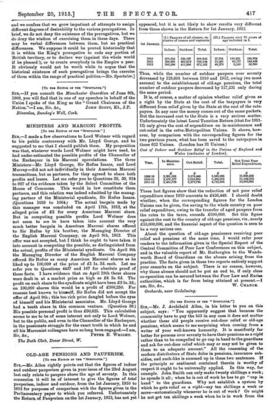MINISTERS AND MARCONI PROFITS.
[To THR EDITOR OP THE "SPECTATOR."] SIR,—I made a few observations to Lord Wolmer with regard to his public controversy with Mr. Lloyd George, and he suggested to me that I should publish them. My proposition was that, whatever words Lord Wolmer might have used, he had under-estimated the possible profits of the Chancellor of the Exchequer in his Marconi speculations. The three Ministers—Mr. Lloyd George, Sir Rufus Isaacs, and Lord Murray—did not act individually in their American Marconi transactions, but as partners, for they agreed to share both profits and losses. Let me refer you to Questions 28, 39, 924 to 927 of the evidence taken by the Select Committee of the House of Commons. This would in law constitute them partners, and this relation was indeed admitted by the manag- ing partner of the Ministerial syndicate, Sir Rufus Isaacs. (Questions 1059 to 1064.) The actual bargain made by this manager was concluded on April 17th, 1912, at the alleged price of £2 for every American Marconi share. But in computing possible profits Lord Wolmer does not seem to use to have taken into account the very much better bargain in American Marconi shares offered to Sir Rufus by his brother, the Managing Director of the English Marconi Company, on April 9th, 1912. This offer was not accepted, but I think be ought to have taken it into account in computing the possible, as distinguished from the actual, profits of the Ministerial syndicate. On April 9th the Managing Director of the English Marconi Company offered Si Rufus as many American Marconi shares as he liked up to 100,000 at the price of LI ls. 3d. each. Let me refer you to Questions 4437 and 167 for absolute proof of these facts. I have evidence that on April 19th these shares were dealt in at a market price as high as £4 2s. 6d. The profit on each share to the syndicate might have been £31s. 3d.; on 100,000 shares this would be a profit of £306,250. For reasons best known to himself, Sir Rufus did not accept the offer of April 9th ; this too rich prize dangled before the eyes of himself and his Ministerial associates. Mr. Lloyd George had a tenth share in this common venture. (Question 39.) His possible personal profit is thus £30,625. This calculation seems to me to be of some interest not only to Lord Wollner, but to the public, and even to the Chancellor of the Exchequer, in the passionate struggle for the exact truth in which he and all his Marconist colleagues have so long been engaged.--I am,










































 Previous page
Previous page